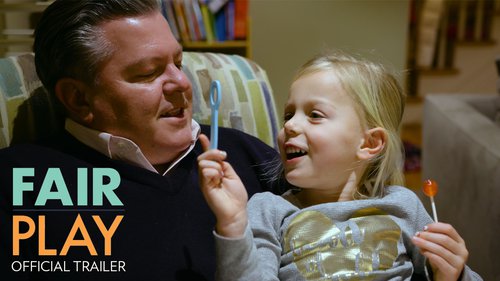“We Need a Structural Change on How We View Women's Time.”
With her book and new documentary, Eve Rodsky is on a mission to upend the unfair division of labor at home.
Blog Post

July 25, 2022
“I’m surprised you didn’t get blueberries,” was the text that Eve Rodsky received from her husband while driving to pick up a toddler, pumping milk for her infant, and contract for work on her lap. This was the line that pushed her over the edge — whatever arrangement they had set up between the two of them for managing the day-to-day of the household was unsustainable. So she set off on a quest to uncover why women were taking on so many burdens at home and then feeling like failures in work and at life because they couldn’t manage it all. She’s been on a mission to change the equation ever since.
Rodsky is the bestselling author of Fair Play, a book on how to better split responsibilities at home between spouses or partners. The theory is — which many experts confirm — that if women want to succeed in the workplace (and world), then men need to do more at home so the overwhelm of family responsibilities does not continue to sideline women. Fair Play has been turned into a documentary, directed by Jennifer Siebel Newsom, the first partner of California, and featuring interviews with New America’s Anne-Marie Slaughter, Pivotal Ventures investor Melinda Gates, Institute for Women’s Policy Research CEO C. Nicole Mason and Katie Porter, D-CA, the only single parent elected to Congress. It was released this month, on July 8, 2022, in theaters and available to stream on-demand.
Better Life Lab’s Rebecca Gale connected with Rodsky for an interview about the film. This interview has been edited for length and clarity.
Better Life Lab (BLL): The premise of the entire Fair Play argument — that for women to succeed in the world, men need to step up and do more at home, really hits home with a lot of working women. In your documentary, you feature an interview with a man on his journey to do more of that heavy lifting at home. For the rest of us, what messages do you feel resonate with men about taking on more of that domestic labor?
Eve Rodsky: I think we are entering a no excuse zone. There is partnership and there is ‘helper-ship.’ In my interviews, men do not say, ‘I hate my kids and my wife and I don't want to participate.’ That is not what is happening. It’s trying to really understand a man’s perspective, which is that there are a lot of hurdles to providing equal partnership. A lot of it is societal conditioning and how workplaces treat the ideal workers. Ironically [two of the husbands in the film] ended up leaving their jobs, and that is what got them more involved in their homes. It’s a tremendous pressure and something has to give. We need those structural supports. And it’s more than paid leave. It’s time for our country to put their money where their mouth is around caregiving. The U.S. spends $500 [on childcare per year], as compared to Norway which is $30,000 per child. With our money, we are showing that many other things are more important than our families, but I don't think we think that as a society.
BLL: So much of Fair Play talks about the invisible work [the unpaid housework and caregiving responsibilities] which is being done largely by women and for no pay. Changing the mindset around invisible work has been one of your goals — how do you think we as a larger society achieve that?
Rodsky: It's the Overton Window (BLL note: the Overton Window is the range of policies politically acceptable to a population at any given time). We need a combination of political will and we need a changing of storytelling and assumptions for structured decision—making. A lot of the [parenting and time—use] books in the 90s were doing that messaging: “Equally share the parenting. Make the same money. Do the exact same child care.” Well, I’ve worked with family systems over 15 years; what I say to my clients and what I believe is you need to employ a structured—decision making tool like Fair Play. You have three things that make a healthy system: define expectations, fairness and transparency, and know your role. A system like that will make the invisible labor finally become visible.
BLL: How might the Fair Play model differ in upper—middle class families vs. families where one or two parents are working to make ends meet and may even then be struggling? What role do financial resources play in making this system work? And how can families with less — and less control over their work hours or schedules — adapt?
Rodsky: When I started this work, I genuinely believed that I thought women with resources and higher up in the workplace didn’t have those issues. That was part of the problem. We didn’t allow women to complain — they didn’t want to be seen as complaining. This last frontier of feminism — the home — is the one area where support systems are incredibly helpful. This is one issue that spans all socioeconomic statuses in all countries, and this is why the Fair Play Policy Institute is trying to cure time poverty for women. When women don’t have a choice on how they use their time, they are never going to be able to use their full power.
The problem with white feminism and the way we have discussed those issues, is that the message you receive is, “If you are so overwhelmed, get help.” Women of higher privilege are being told they can cure the issue for themselves on the backs of Black and brown women (women of color make up over half of domestic workers and 40 percent of child care workers). This outsourcing narrative has been the real hurdle — we need to unite women and understand that this affects all women.
BLL: The “I didn’t want to have to ask” mantra comes up a lot — many women delegating responsibilities that take mental energy to keep track of. What have you found works best to integrate those systems at home?
Rodsky: The secret formula requires three things: boundaries, system and communication. You need all three if you want to get to a place where you don’t have to ask. Many people in my study have one or two of the three, but not all the three. And then they have a ‘helper,’ not a ‘partner.’
You need a partner who believes your time is equal to theirs, you need a system — whatever structured decision—making to know what you are doing in advance, and then you have to have communication. And with this comes a consistent dedication to the practice of high—cognition, low—emotion conversation.
BLL: There’s the concept that men can do more at home, but also that workplaces can do more to encourage more of that behavior with family—friendly policies like paternity leave, which was a novel concept until about a decade ago here in the United States. What else needs to be done there? And how can such changes resonate with families who are past the stage of newborns?
Rodsky: Did you see the documentary that had Tucker Carlson mocking paternity leave? [In October 2021, the right-wing commentator Tucker Carlson called paternity leave “trying to figure out how to breastfeed. ” when Transportation Secretary Pete Buttigieg took time off for newborn twins.]
This is back to the Overton Window. We need a structural change on how we view women's time. It has to be guarded like men's time. The Fair Play movement is based on five words: All time is created equal. People can think that is an obvious statement, but it’s not at all. We know if women enter a [male-dominated] occupation, the salaries go down. We tell people breastfeeding is free, but it takes 1800 hours a year. Now the AAP (American Academy of Pediatrics) wants us to do that for two years. The truth is that it's the choice of what you get to do is what I care about — if you want to breastfeed, do it. But not because of the outdated assumptions of AAP or your partner.

BLL: Producing a movie is much different than writing a book — what came up along the way that colored your experience, and did you learn anything new about the topic when presenting it in visual form?
Rodsky: There is real power in different mediums as we tell the stories. This goes back to the Overton Window, the idea that society doesn’t change unless you are bombarding that society with many different ways to tell those stories. We have missed some really important storytelling opportunities. Especially in the feminist movement. I think we have assumed because we care about GDP growth, we assume that society wants women in the workplace, but that is not true. We know from the Pew study, nearly 60 percent of Americans want one parent at home. We are not ready for [two—income households] even though we have been here for 50 years. We are a nation of two—earner families but it is absolutely not what society thinks or believes. That discrepancy, the ghost of the “Leave it To Beaver” mother is haunting us and our policies.
BLL: Fair Play included couples of all stripes — same sex and heterosexual, which a decade ago might have seemed unsual but now is understood to be the norm in more places and populations. If this movie was being made ten years from now, what about family dynamics do you think would look different? Do you anticipate more equality, or are these gender norms going to take generations to shift?
Rodsky: I am hoping this movie would be outdated. I am hoping people would think this would be too trite and an embarrassment that [one of the dads] doing puzzles on the floor would be considered fair. I hope people look back at this and cringe, and think, “People had such a low bar for men.” You gotta start somewhere.
We spent a lot of time interviewing [couples of] all dispositions. In a 90-minute film on heteronormative dynamics, we were only able to get a 15 minute segment in [on LGBTQIA couples]. So many of the couples felt forced into heteronormative arrangements. We should be learning from other arrangements. [For the LGBTQIA couples], they were being asked, “Who is the woman and who is the man in the relationship?” That was alarming to me.
I’ve been [talking about this movie] to Washington and a lot of major companies. Many people didn’t pick up and write notes when we were talking about women adding to the GDP. But when I said that the stress—related illnesses that come from women holding two—thirds or more of the [emotional labor] cards — every single one of them was being treated for stress-related illness. So we are trying to get a cortisol study now. And this is when people started taking notes. So ten years from now, what will be different? I pray that people are taking this seriously as a health issue for women. Because we need to see it that way too.
Rebecca Gale is a reporting fellow for Better Life Lab.